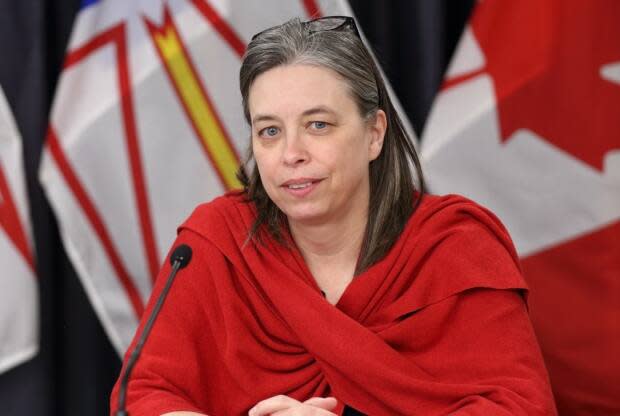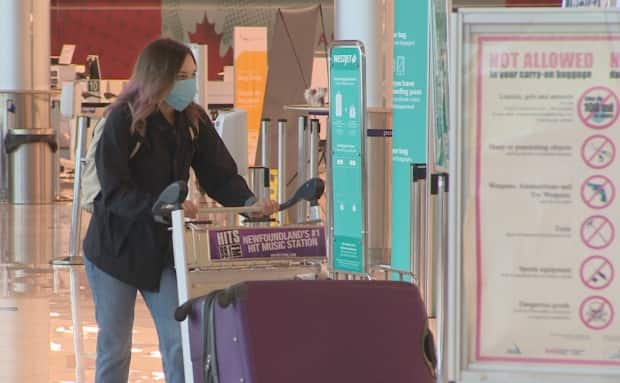Furey, Fitzgerald plead with young adults to help curb spread of COVID-19

The Newfoundland and Labrador government is asking young adults to help curb the spread of COVID-19.
On Wednesday Chief Medical Officer of Health Dr. Janice Fitzgerald spoke directly to people age 18 to 35 in the province, noting the demographic is driving a surge in cases across the country and in jurisdictions around the world.
"I believe you are an amazing force," said Fitzgerald. "My heart is filled with hope that our planet and society will be in your hands in the not too distant future. ... Today I am asking you to step up once again and be leaders and heroes in the prevention of COVID-19."
Many in that age bracket work in places where physical distancing is challenging, said Fitzgerald, are exposed to multiple bubbles and are more likely to participate in gatherings than other age groups.
Fitzgerald said young adults should choose outdoor activities for socializing, and to select up to six close contacts and ensure physical distancing if socializing indoors.
"We have the tools and the ability to keep COVID-19 at bay," she said.
Watch the full Nov. 25 update:
Premier Andrew Furey said the youth of the province are an extra layer — along with masks and social distancing — to help stop the spread of COVID-19.
"If you take charge as you have on so many important issues in our province, and have shown real leadership, you can also show real leadership here in helping curb the spread," said Furey.
"Please, please step up once again and show the capacity you have in leading this province to safety."
Provincial government officials will now hold live COVID-19 briefings three days a week, on Monday, Wednesday and Friday.
Furey said the decision was made provide the public with the knowledge it needs to keep schools and businesses open.
1 new case
Newfoundland and Labrador is reporting one new case of COVID-19 on Wednesday, in the Western Health region.
Chief Medical Officer of Health Dr. Janice Fitzgerald said the new case is a woman between 40 and 49 years old, a contact of a previous case in the region. Fitzgerald said the woman is in isolation and contact tracing is underway.
The province now has 25 active cases of COVID-19, with 295 recoveries and four deaths since March.
Fitzgerald said there is no indication yet of widespread community transmission of the virus in the province.
"That being said, we should always assume COVID can be anywhere, any time and we should act accordingly," she said.
A small cluster of cases in Deer Lake has raised concerns from residents in the area, prompting the municipal government to close buildings and recreational facilities. Elwood Elementary was closed Monday after a student tested positive.
On Wednesday, Fitzgerald said everybody in the affected cohort has been tested, more than 30 people, and there have been no other positive cases in that group.

Furey addressed Deer Lake and Grand Bank directly during Wednesday's briefing, saying the province is doing everything it can to combat clusters of COVID-19 in those communities.
"But we can't do that without your help. Your extra vigilance is needed at this time," he said.
Health Minister John Haggie said the test positivity rate — the number of tests over a period of time that return positive results — should ideally be below five per cent, to "show the adequacy of testing and adequacy of contact tracing and identifying cases."
Saskatchewan and Manitoba are running between eight and 10 per cent, and there are areas of Alberta where it can't be calculated accurately, said Haggie. But Newfoundland and Labrador's daily rate is about one quarter of one percent, he said, "which suggests that not only we have adequate capacity for testing, we also have contact tracing that is working well."
To date, 60,199 people have been tested across the province, an increase of 458 since Tuesday's update.
Updates to travelling
In a press release Wednesday the Department of Health advised rotational workers about a COVID-19 outbreak at the Imperial Oil Cold Lake work site in Alberta. The department said it was notified of the outbreak by the Public Health Agency of Canada, as workers from Newfoundland and Labrador work on the project.
Project workers who have returned to the province in the last two weeks must isolate away from household members and call 811 to arrange testing, and complete a full 14-day self-isolation, regardless of test result, says the release.
As of Dec. 1, said Fitzgerald, the provincial government's COVID-19 website will outline acceptable reasons for travellers to enter the province. Fitzgerald said the update is to make it "very clear" to travellers whether they will be allowed in, and what is required of them upon entry.
Another addition to the travel process is a requirement for essential workers to state what sector they are working in and their work site in the province, and to provide their employer's contact information.
"I want to reinforce that travel at this time should only be for essential reasons," Fitzgerald said. "Newfoundland and Labrador is still in a public health emergency."

The regular weekly briefing on Wednesday followed an uptick in cases this month, most of them clustered in Deer Lake, Grand Bank and St. John's.
To clamp down on the caseload, those municipalities have locked down some facilities and cancelled some events.
Most recently, officials have asked anyone returning from Nova Scotia in the last two weeks, and who visited bars in Halifax and the surrounding metro communities, to call 811 to arrange COVID-19 testing, even if they aren't experiencing symptoms.
Also this week, officials changed the self-isolation rules for rotational workers returning home from other provinces. As of this morning, those workers now have to wait until Day 7 — instead of Day 5 — to get a COVID-19 test to reduce the chances of a false negative.
Cases on the rise countrywide
Elsewhere in Canada, cases have steadily increased. Nova Scotia, which reported 37 new cases Tuesday, has advised large swathes of its metro population to get a test and has confirmed community spread, while Alberta and B.C. are reporting record numbers of positive tests.
Alberta has banned private indoor gatherings and moved all students Grade 7 and above to at-home learning, but will keep restaurants, businesses and casinos open at reduced capacity.
Parts of Ontario also entered lockdown this week, with non-essential businesses closed and gatherings limited to one household, except for those who live alone. Schools there remain open.
Prince Edward Island has a new case on Wednesday, a woman who travelled to the province from eslewhere in Atlantic Canada.
Newfoundland and Labrador has largely avoided new lockdown measures so far. Furey said Monday that this week's new self-isolation restrictions for rotational workers and incoming travellers from the Atlantic region could prevent heftier controls.
"The Atlantic bubble has been a source of pride … but the situation has changed," Furey said during Monday's COVID-19 briefing.
Last week, a man returned to St. John's from Nova Scotia, and under rules in place at the time, was not required to isolate. That prompted a St. John's restaurant, where he had been a customer, to close of its own initiative and ask its employees to get tested.


